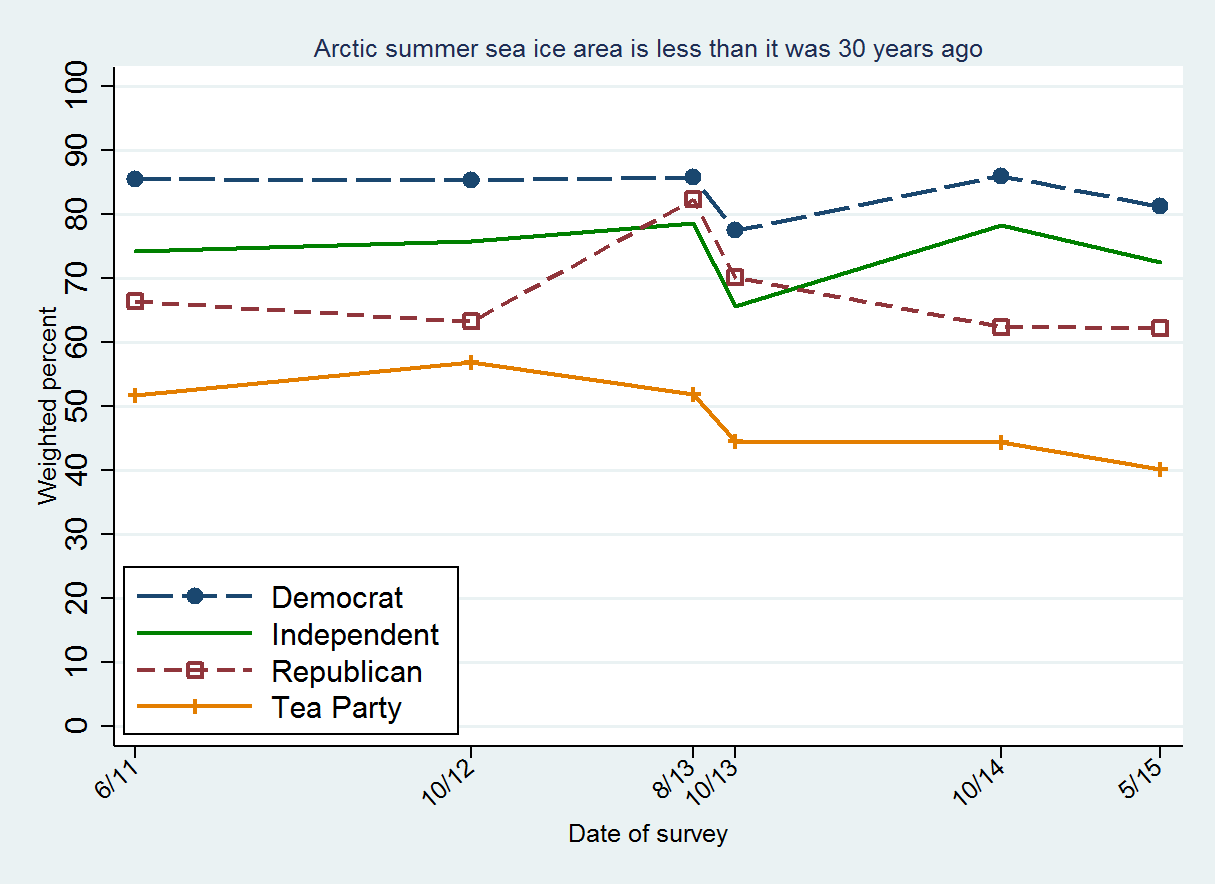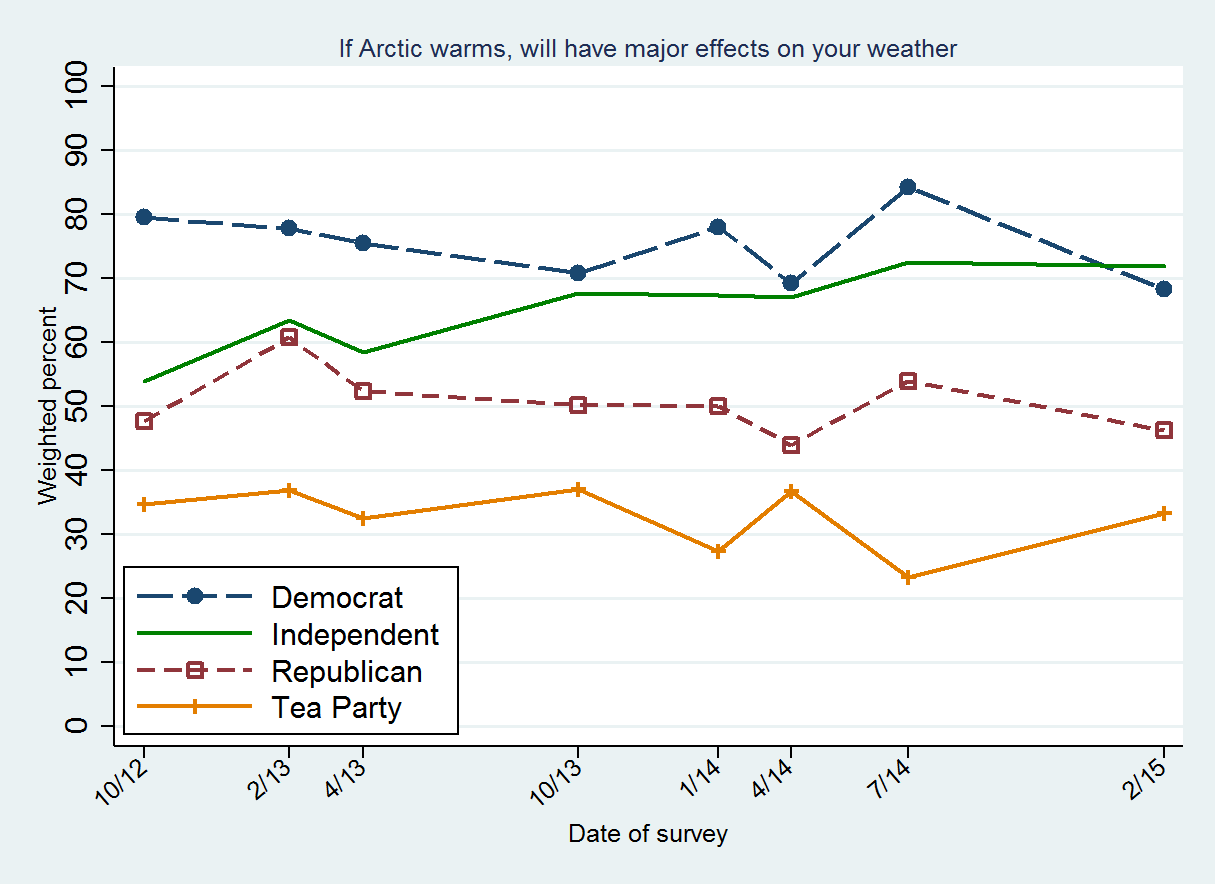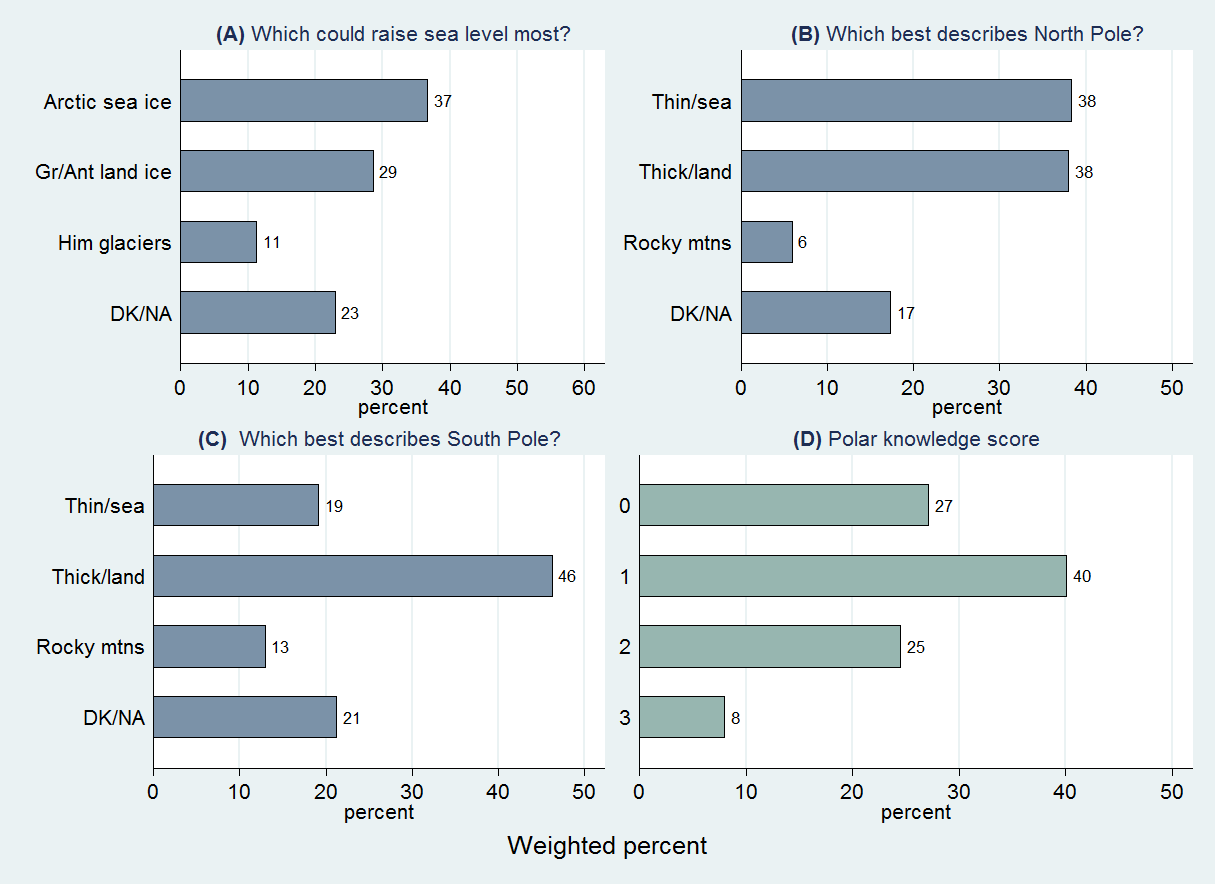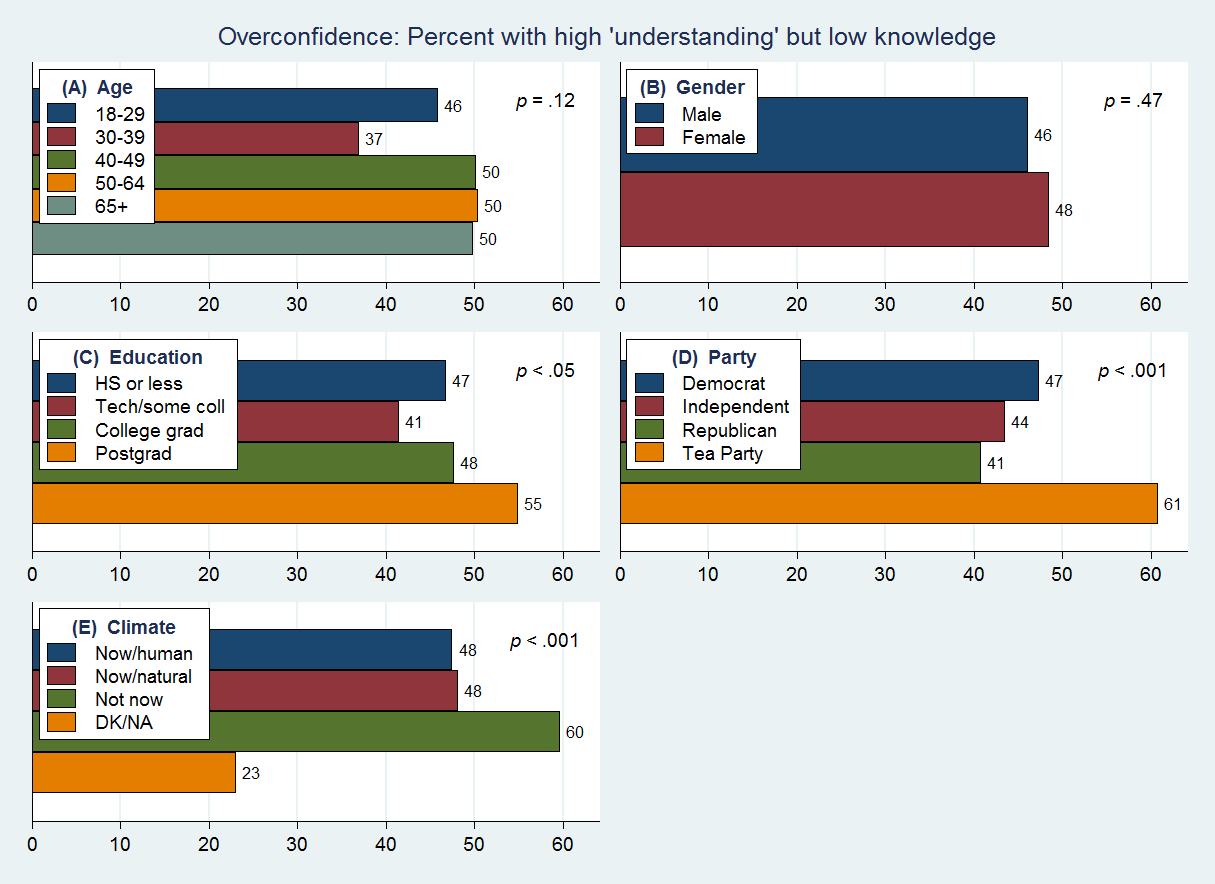Who knows what about the polar regions? Polar facts in the age of polarization
Posted on 10 July 2015 by Guest Author
This is a guest post by Lawrence Hamilton, Senior Fellow at the Carsey School of Public Policy, University of New Hampshire.
What do people know about the polar regions? Who knows what? New survey research recently published in Polar Geography offers un-reassuring answers. On some purely factual questions, people responded as if asked for their political opinions. For example, the graph below tracks responses to a question about the area of Arctic sea ice.

Figure 1: Correct responses by political party to the survey question: Which of the following three statements do you think is more accurate? Over the past few years, the ice on the Arctic Ocean in late summer – covers less area than it did 30 years ago; declined but then recovered to about the same area it had 30 years ago; or covers more area than it did 30 years ago.
This graph shows the percentage of “less area” responses, which are unambiguously correct — late-summer sea ice area in recent years has been more than a million square kilometers less than in the 1980s. Our political indicator, developed for an earlier paper, separates Tea Party supporters from other groups. Democrats and Tea Partiers stand about 35 points apart in their beliefs about the area of Arctic sea ice. Independents and non-Tea Party Republicans average just 7 points apart. The data are from 3,149 interviews on six New Hampshire (US) surveys, June 2011 to May 2015.
Certain other factual questions such as whether atmospheric CO2 levels have increased show similar political patterns. Partisan divisions are even wider on a more speculative question about the effects future Arctic warming might have on mid-latitude weather.

Figure 2: Responses (percentage choosing “major effects”) by political party to the survey question: If the Arctic region becomes warmer in the future, do you think that will have – no effects on the weather where you live; minor effects on the weather where you live; or major effects on the weather where you live?
These questions have answers that are guessable (correctly or not) from what you personally believe about climate change. Consequently, the responses behave like opinions. Another kind of question has answers that are not guessable from climate-change beliefs. Bar charts below show three examples, and a knowledge score defined as the number correct (0–3). Percentages are based on 1,570 New Hampshire survey respondents who were asked all three of these belief-neutral questions.

Figure 3: Responses to three “belief-neutral” survey questions about polar knowledge.
A. Which of the following possible changes would, if it happened, do the most to raise sea levels? – melting of sea ice on the Arctic Ocean; melting of land ice in Greenland and the Antarctic (correct answer); or melting of glaciers in the Himalaya and Alaska.
B. Which of these best describes the North Pole? – ice a few feet or yards thick, floating over a deep ocean (correct answer); ice more than a mile thick, over land; or a mainly rocky, mountainous landscape.
C. Which of these best describes the South Pole? – ice a few feet or yards thick, floating over a deep ocean; ice more than a mile thick, over land (correct answer); or a mainly rocky, mountainous landscape.
D. Number of correct answers (0-3).
Only 37% knew or guessed that the North Pole is on sea ice, and even fewer (29%) recognized that melting of Greenland and Antarctic land ice, rather than Arctic sea ice, could potentially do the most to raise sea levels. Forty-six percent correctly placed the South Pole on thick ice over land, but since many said the same about the North Pole, that might partly reflect a bias toward “thick ice over land.” Two-thirds of our sample got no more than one answer on these three-choice questions correct.
Many surveys have included two standard questions about climate change:
1) How much do you feel you understand about global warming or climate change? – a great deal; a moderate amount; only a little; or nothing at all?
2) Which of the following three statements do you personally believe? – climate change is happening now, caused mainly by human activities; climate change is happening now, but caused mainly by natural forces; climate change is not happening now.
The second, “personally believe” question yields stark and persistent divisions, analyzed in several papers (2011, 2012, 2015). The “understanding” responses to the first question are striking for a different reason: so many people (78% in New Hampshire) say they understand either a moderate amount or a great deal about climate change.
Our knowledge score provides a reality check using a few basic but neutral facts that anyone paying attention to climate discussions (or a globe) ought to know. Overconfidence, defined as moderate or great “understanding” combined with low knowledge (no more than one answer correct), characterizes almost half our sample. Bar charts below show rates of overconfidence within subgroups.

Figure 4: Percentage of overconfident respondents, or those reporting moderate/great understanding but having low knowledge scores.
Overconfidence is not significantly related to age or gender (Fig. 4A and B). It is somewhat more prevalent among people with postgraduate education (Fig 4C), but larger differences occur by political party (Fig 4D) and climate-change beliefs (Fig. 4E). Democrats, Independents and Republicans are not far apart, whereas Tea Party supporters significantly more often (61%) combine high self-assessed understanding with low knowledge. Rates of overconfidence are similarly high (60%) among those who think climate change is not happening.
The false sense of understanding has ideological roots. Previous studies found that Tea Party supporters report the highest levels of understanding about climate change (Leiserowitz et al. 2011, pdf; Hamilton and Saito 2015). That occurs in these surveys as well: 43% of Tea Party supporters, compared with just 18% of Republicans, 21% of Independents, and 31% of Democrats say they have “a great deal” of understanding about climate change. Polar knowledge scores, however, point in the opposite direction: only 27% of Tea Party supporters, compared with 31% of Republicans or Independents, and 39% of Democrats, answered two or three questions correctly.
These results support a common-sense view that we need a mix of approaches to address people with different configurations of knowledge and certainty. Communicating the strength of scientific consensus might be most helpful as a heuristic for people without much science knowledge and without strong preconceptions. Detailed information such as Skeptical Science counter-arguments could help those who know some science already, and are open to learn more. To make inroads against what Kraft et al. 2015 term the “hyperskepticism toward scientific evidence among ideologues,” more culturally-tailored approaches are needed. The pace of polar change gives context and urgency to communication efforts.































 Arguments
Arguments






























I'm sure I'm not the only one who has doubts regarding the value of asking members of the general public whether a future warming Arctic would have no, minor, or major effects on the weather where they live. It is not an easy question to answer with confidence even for the knowledgeable, and answers could legitimately vary with the respondent's location (Fairbanks versus Rio de Janeiro, for instance).
But the results from the other more concrete questions are readily predictable from observing the error-filled nonsense that people repeatedly post on this topic on blogs and media comment forums.
Magma:
Note that the article mentions that "Percentages are based on 1,570 New Hampshire survey respondents..." If that statement applies to all the survey results reported here, then geographical location would not be an issue. You'd probably have to read the original study to be sure (which I have not done).
The Fictional Conservatives, formly known as The NeoCons, aren't going to like this Liberal/Socialist/Communist study.
@Magma, you're right the Arctic/weather question invites speculation (albeit, a speculation often heard on New Hampshire weather reports), while the sea ice area question is just factual. Oddly though, survey responses to both of them behave as if we'd asked for political opinions.The North Pole, South Pole and sealevel questions on the other hand don't act this way.
In case anyone is interested in seeing the article itself, I should mention that the publisher currently has it freely accessible at
http://www.tandfonline.com/doi/abs/10.1080/1088937X.2015.1051158#.VaBGXvnGAYE
It's my understanding that the Polar Geography paper will go behind a paywall at some later date, perhaps in a month or two.
Magma @1:
My description, which I consider to be high in confidence, is thus:
"When the Arctic ice cap disappears during the summer you will have more evaporation from the exposed water. When that happens there will be more intense rain with flooding."
The most interesting graphs are the first two. They show that (no error bars) even Democrat understanding has gone down during the period. Probably reflecting the ever present misinformation campaigns?
Making it a crime to spread misinformation about AGW would have a huge impact on the situation. Call it "climate terrorism" or something.
Larry - Thanks for your most interesting (to me at least!) research. A pointer to some related work of my own, if I may:
Is Time Running Out for Arctic Sea Ice?
The answer is yes, according to David Barber, Peter Wadhams and others:
The retreat of the sea ice in summer is going much faster than computer models predict, and we think that one factor there is the fact that as the sea ice retreats it opens up this huge area of open water in the Arctic Ocean which then becomes like an ocean, with lots of waves and storms and swell, and the waves themselves break the remaining ice up and cause it to retreat faster so that there’s a kind of collaborative effect there that the remaining ice is vanishing faster because of so much open water producing wave action.
In addition, here's a video I recently recorded concerning the neurophysiology of climate change "skepticism" which you may find interesting:
https://youtu.be/M2nZy6JoI1w
Accurate political predictions can be achieved through modelling brain function. This produces a new view of human nature, with biology subservient to the demands of human politics and its shifting coalitions, making our brains hardwired not to be hardwired.
In the link offered by Jim Hunt, there are considerations of differentiating people's thinking from a variety of perspectives: Competitive Us vs. Them, Reflective vs Reactive, Liberal vs Conservative.
It is possible that there are value sets or life perspectives that are the real differentiation of the over-confidence and misunderstanding identified by this type of survey. And that people with those characteristics can identify with any of the political groups but have a tendency towards identifying personally with certain political groups, including Liberal and Conservative.
My observations through my life of the people I work with and socialize with, and of what is reported in the News and Magazines seem to indicate that people demanding more freedom to do as they please tend to care less about understanding the potential negative impacts of what they want to do. Their focus is on things like their personal benefit, pleasure, profit, comfort or convenience any way they are able to get away with. And they usually prefer the cheapest way of getting what they want and they want it all if they can get it. And many of them fight against anything that would limit their freedom to get away with things.
The results of that type of attitude are the popularity and profitability of many activities that can be understood to not be able to be done far into the future, and activities that are actually harmful to the ability of humanity to live well in the future.
It would be interesting to see how the results of this type of research questioning would correlate to Ayn Rand style Liberalism in pursuit of maximum personal Happiness or benefit, that is disassociated from the responsibility to understand matters as thoroughly as possible and thoughtfully and considerately limit personal actions to efforts and activities that will develop, or be part of, a lasting better future or everyone.
It would also be interesting to see how a near term monetary and materialistic mind-set correlates to overconfidence and misunderstanding of these types of questions.
In my previous post "Ayn Rand stlye Libertarianism" is probably a better term for what I am referring to.